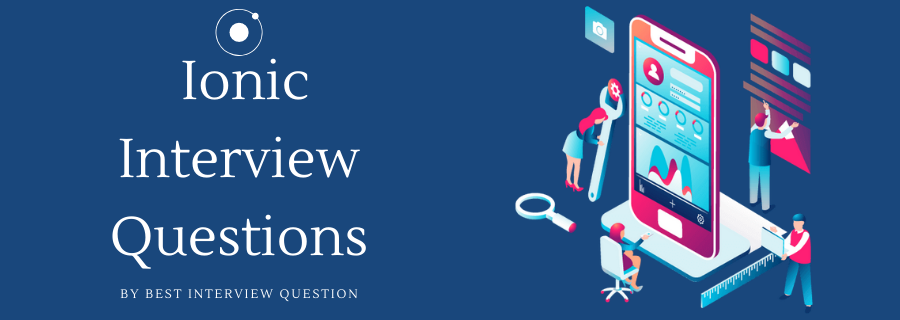Ionic Interview Questions and Answers

A front-end, HTML5 mobile application development framework, Ionic is designed to build hybrid apps. You can think of Ionic as the framework that manages the look, feel and UI an app needs to be attractive. The ionic structure uses web technologies such as CSS, HTML5, and Sass for developing hybrid mobile apps. These apps can then be distributed through native app stores on individual devices through Cordova.
With built-in native mobile elements and layouts, Ionic offers powerful ways to build mobile apps that are both attractive and have high performance. Ionic being an HTML5 framework, it requires Cordova or PhoneGap to run as a native app. We have recently updated our ionic interview questions. Do read them before your next job interview.
Advantages of Ionic
- Its cross-platform nature allows you to package apps for multi-platforms which saves time.
- Provides pre-generated application setup with a convenient layout
- Apps are easy to maintain and update
- Good online support groups
Are you an ionic programmer? Read our ionic interview questions and answers to stay updated.
Most Frequently Asked Ionic Interview Questions
Services play a vital role in Ionic as it provides information to the application and performs different tasks. Some of the critical services are Simple Alert, Connectivity Monitor, Google Maps and data. If you are using, remember that importing a service and adding a provider to it are the most crucial aspects.
The services should only be imported into the classes where you will be using them.
Storage is the easiest way to store key, values and JSON objects in the Ionic Framework. Engines are used in storage. In a web application, storage will use WebSQL, IndexedDB, and local storage. Here are some of the storage available in ionic:
- HTML5 local storage
- Cookie and session storage
- IndexedDB
- WebSQL
- PouchDB
- Web service/api storage
- Cordova storage
Observables are not specific to Ionic or Angular. These are provided by RxJS library and can do a lot of tasks. They can deal with multiple values simultaneously and can manipulate the data associated with it. However, Observables will not get executed until you subscribe to them.
It is a Typescript wrapper for PhoneGap/Cordova plugins. Its purpose is to ease the process of adding native functionalities to your Ionic app.
| React Native | Ionic | |
|---|---|---|
| 1. | Uses functional interface | Web technologies for improved portability |
| 2. | Code language is JSX | Code language is Typescript |
| 3. | No web view | Uses web view |
| 3. | Testing requires emulator | Testing can be done on any browser |
Development History of Ionic App
Ionic was developed by Adam Bradley, Ben Sperry, and Max Lynch in 2013. They released the first version in 2013, which was built on Apache Cordova and AngularJS and. Potential candidates must know this information if they are preparing for ionic framework interview questions.
Latest Version: The most recent version is 1.3.3 "Germany," which was released in Feb 2017.